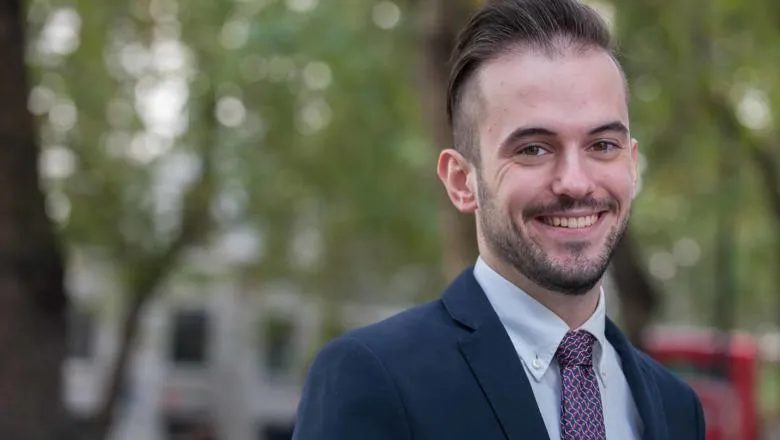09 December 2020
Christopher Hazelhurst
Christopher Hazelhurst is a current PhD student at King's Business School.

Tell us a little bit about your PhD research topic.
The topic of my PhD is to determine how firms use digital communication and social technologies in their strategic management process. I have collected data from British and German businesses to find out if there are any international differences in practices.
I am supervised by Professor Keith Brothers and Dr Michael Etter. I meet them both on a regular basis and they give me valuable feedback and guidance drawing on their extensive research and publishing experience.
What are your research interests and how did they evolve?
One of my main interests is how firms are managing with the increasing amount of information that is available to them. I want to understand why some firms are adopting certain types of technology and others stick to more traditional forms of business strategy-making.
I am also very interested in ‘open strategising’; that is firms moving away from the traditional closed and secretive strategy process, making it a more inclusive and participatory and endeavour.
What motivated you to do a PhD and what were you doing before?
Before I started my PhD, I was working as a student liaison assistant for UK University. This gave me a really good insight into the work of academics. I did an integrated Masters degree in the fashion Business School at London College of Fashion, one of the few specialist business schools in the UK. As part of my degree I spent a year working in the fashion industry, and I realised I enjoy studying and observing businesses more than I do actually working in them. This is what triggered my ambition to become a researcher.
What have you most enjoyed about your PhD so far?
It is definitely the freedom and flexibility that you get when you work in academia. It is your own project and your own work which has the potential to help businesses improve their own performance and the livelihood of their stakeholders.
Through my research, I have found it really rewarding to speak to many senior business leaders and executives of some very interesting companies to understand what struggles and problems they are facing.
Equally, I really enjoy the exchange with my colleagues, the faculty and other academics from all over the world, for example at conferences. It is a very collegial atmosphere, and learning something new every single day is really motivating
What were some of the challenges of PhD research and how did you overcome them?
Like many researchers, one of the biggest issues that I encountered was recruiting participants for my quantitative study. It took a lot of effort folding letters and sending follow-up emails to get the numbers that I needed, with Brexit uncertainty and the Covid-19 pandemic really challenging businesses’ time and willingness to engage.
What has your experience been transitioning from student to researcher?
A PhD is much more complex, unpredictable and long-term than a master’s dissertation and so the system I had in place for my Master’s didn’t really work. I became more flexible with my approaches to research, in terms of how I scanned the literature or do my writing. Even now, in the writing-up stage of my PhD, I still spend some time every week checking for new publications in my research area. On top of that you have to be more flexible with your time management as I have also teaching responsibilities and work on other research projects.
Why did you choose King’s Business School?
The supervisor was my top criteria when it came to looking for a PhD place, but it was also important that the University should have a good reputation and scholarship in the field of business management.
What I also liked about King's was the fact that the PhD community is just the right size so that you get to meet a lot of people from different areas and parts of the world and make some new friends, while also being very much embedded with the faculty.
Being part of King's College London also has lots of additional benefits, and in my first year I attended so many different training courses and was able to expand my research skills, as well as my understanding of research philosophies and advanced statistical analysis.
What are your career aspirations? How has your time at King’s Business School influenced your thinking?
I am planning to continue working in research and higher education at a University. I really enjoy research and I also enjoy teaching and was very happy to be accepted as an associate fellow at Advance HE UK.
What advice would you give to those looking to study for a PhD in your subject?
Spend a lot of time reading into various topics and issues, but do not just focus on the academic literature; look at trend reports or interviews with business leaders. As researchers, we ideally want to provide solutions to real problems, so of course it is very important to find out what is it that business leaders or politicians are struggling with.
